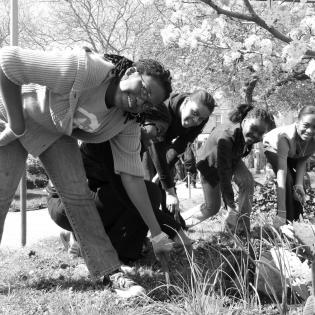Environmental Play and Justice
What are the forces in our lives that separate us from the outdoors today, and what can we do to fuel up on the power of nature? In this lesson, young people research the benefits of being outside and the human impact on the environment or about environmental justice issues with a local impact. Then they make a service-learning plan to take action to protect nature and get others outside in nature or to address an enviromental justice issue they've identified. This lesson is suitable for physical education, biology, geography, and English classes.
The learners will...
- research environmental issues locally and globally.
- make a plan to take action as a nature steward.
- Internet access to research
- books about birds, flowers, trees or other "hobby" areas
- access to a natural area for walking and observation
In building an understanding of stewardship, young people must be attentive and curious in nature and aware of environnmental issues. Give them lots of opportunity to get outside, investigate hobbies like observing birds and trees and flowers, organize fitness activities, and talk about what they observe and can do. If your school is not located near natural beauty, find an area of focus in nature, such as sky, trees, or birds.
stewardship: (n) the careful and responsible management of something entrusted to one's care
- What are the benefits of being outside in nature?
- What did you observe with your senses when you were outside? What looks different today than it did yesterday or last month?
- What issues did you research and what human impact caused the issue?
- What can we do to improve or take care of an outdoor space? Who else might enjoy that space?
- How do you feel when you take care of nature?
Harvard Health Letter. "A prescription for better health: go alfresco" July, 2010. https://www.health.harvard.edu/newsletter_article/a-prescription-for-better-health-go-alfresco
Instructions
Anticipatory Set:
Go for a walk and look for natural spaces that have beauty and function. Note that in urban areas, natural spaces may be slivers of trees, grass, flowers and wildlife that are found in between concrete structures or may be found near birdfeeders. Discuss how we feel when we observe beautiful and diverse sounds, textures, and colors in nature. Discuss how people can enjoy and take responsiblity for stewardship of nature.
Share these research-based reasons to get outside instead of staying inside.
- Fun to see new things in nature
- Makes you healthier
- Makes you happier
- Helps you sleep
- Taking care of nature keeps us alive because nature feeds us and helps us breathe.
Discuss: If getting outside is good for each of us individually, what benefit is there to our community if we encourage others to get outside and be environmental stewards? Discussion points may include the following:
- More healthy people in our community is good for all.
- We get outside together and have fun.
- We feel good about helping others and taking care of the environment.
- We improve the environmental health of our community for all.
- We spark interest in hobbies like birding, hiking, running, picnics, and games.
What environmental issue do you want to address with your time, talent, treasure, ties or tesimony, and who in the community would join you?
If environmental issues are of concern in your community, young people may help bring awareness to them. Here are some basic research questions.
- What are the environmental areas or issues people care about in your neighborhood?
- What data exists to describe the environmental impact of an issue?
- What organizations protect the environment? What can we do to help them?
Project: Plan one thing to do that involves getting people out in nature or taking care of the environment. What can we do to build community in nature with older people, younger people, families, or other schools?
This may mean organizing a hike, cleaning up a park with the neighborhood, building a mud kitchen for young children at a nature center, gardening with seniors, organizing an outdoor sport or fitness activity, or learning about bird-watching.
Make a plan and carry it out with the service-learning process.This video describes how to plan a project.
Be sure to include other people and spread the word about how much fun it was and the difference it makes in nature.
Writing prompt: "Write a paragraph telling what you will do to take care of and enjoy nature."
Philanthropy Framework
-
Strand PHIL.III Philanthropy and the Individual
-
Standard PI 01. Reasons for Individual Philanthropy
-
Benchmark HS.5 Compare and contrast opportunities for students to improve the common good to the opportunities available to students in other countries.
-
-
-
Strand PHIL.IV Volunteering and Service
-
Standard VS 01. Needs Assessment
-
Benchmark HS.1 Identify a need in the school, local community, state, nation, or world.
-
Benchmark HS.2 Research the need in the school, neighborhood, local community, state, nation, or world.
-
-
Standard VS 02. Service and Learning
-
Benchmark HS.1 Select a service project based on interests, abilities, and research.
-
-
